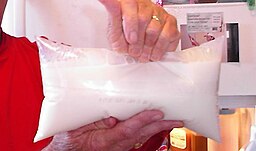Milk bag
This article needs additional citations for verification. (April 2009) |

Milk bags are plastic bags that hold milk. They are usually stored in a pitcher with one of the corners cut off to allow for pouring. A typical milk bag contains 1 or 1.33 liters of milk and is often purchased in bundles of two, three, or four.
Popularity

Milk bags are common in several countries and regions of the world, including Argentina, Canada, Hungary, India, Israel, Montenegro, Poland, South Africa, and Uruguay.
Milk bags were common in Bulgaria and other Balkan countries during the Soviet bloc period but diminished in popularity in subsequent years. Declining popularity in this region is attributed to the lower shelf appeal of the milk bags compared to others emerging at the time such as Tetra Pak and plastic bottles.[citation needed]

Benefits
Milk bags use less plastic than traditional milk jugs and are placed in reusable plastic pitchers. Milk bags are usually made of high-density polyethylene and are recyclable. Milk bags use 75% less plastic than similar-capacity plastic milk bottles. This is beneficial because it reduces overall cost of milk and is more environmentally friendly.[1]
Milk bags are also economical because they hold a smaller amount of milk than milk jugs, which allows for less waste.
Drawbacks

Milk bags can be punctured or burst. They are weaker than milk jugs because of their thickness. When pouring, the top of the bag can also topple over, causing the milk to spill. This can be avoided by using a pitcher with a lid to keep the milk bag in place.
Cultural significance
Canadian culture
Many Canadians believe that bagged milk is a unique and esteemed part of Canadian culture. This has caused much of Canada to keep the 1.33 liter bag because it separates Canada from other countries. In Ontario, the Maritimes, and Quebec, milk bags are seen as Canadian as tuques or maple syrup.[citation needed]
Popular culture
In the opening sequence of A Hard Day's Night, a bystander buys a small milk bag from a vending machine.
References
- ^ Prigg, Mark (2008-02-04). "Forget milk in a bottle, it's now in a bag". Evening Standard. Retrieved 2008-10-13.
{{cite web}}: Italic or bold markup not allowed in:|publisher=(help)
